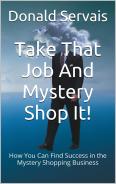Tax Deductible Expenses
for Mystery Shoppers
It's essential to keep your tax deductible expenses in order when starting a mystery shopping business. You can write off many items that you spend on your business.
I interviewed Suzette Plumb-Trevino, a tax expert who has done my taxes for many years. She offered four important tips when preparing your tax deductible expenses for the Internal Revenue Service.
1. Write down every deduction that you can, no matter how trivial it may
be. Tax laws change from year to year and you never know if it may
apply.

I have a simple spreadsheet that I use to write everything down. I
have a column for location, round trip miles driven, amount spent, amount
earned and date paid. I place all receipts in a large envelope.
2. Open a separate bank account for the business and use it only for the business. It’s easier to keep track of what you spend and when you spend it. This is really helpful at the end of the year.
3. Follow the Schedule C on the Income Tax form. The Schedule C is where you report your profit (or loss) from your business. There are specific lines to enter your expenses, figure out your mileage, and a formula for writing off the work space in your home if you choose.
4. Do not use too many miscellaneous claims when itemizing your tax deductions. It's alright to have a few items, but too many deductions listed as miscellaneous may draw unwanted attention from the IRS. You may have to get a little creative to find a category for some of your legitimate expenses.
Mystery shopping can be quite profitable, however one year I did a lot of restaurant assignments and I ended up taking a loss. That’s not always a bad thing either. Because of the tax deductible expenses, I was reimbursed for my meals, I ate some great food and I was placed in a lower tax bracket. For me, that was a win-win-win.
Learn more about the legality of mystery shopping
Travel and meals that are tax deductible expenses
Many mystery shoppers travel from one location to another and many times will spend a night or two in a hotel. If you have to pay for everything on your own, you would be able to write-off miles driven, meals and hotel stays. Many veteran mystery shoppers will "route shop," which means they schedule a bunch of assignments when they travel to different cities.
Sometimes a mystery shopping company will offer you a travel package to do many assignments for them that will include travel, hotel, and meal allowance. Anything you pay for these services will not be tax deductible expenses. The travel package serves as a reimbursement for all those items. If you're not offered a travel package, you can write-off these expenses.
Be careful about a meal before or after an assignment. If you travel a short distance away from home and eat at a restaurant, that probably won't be considered a tax deduction. However, it you travel one hundred miles or more away to do an assignment, a meal probably would be a deduction. Here’s an example:
One day, I was offered $200 to do a 20-minute assignment for an apartment that was 125 miles away. After I was done with the assignment, I stopped at a quick service restaurant and ordered dinner. The round trip took 5 hours out of my day. I wrote the meal off as a tax deduction. (The payment did not include a meal allowance.)
I've had
occasions where I went to a new home builder location to do an assignment and
discovered there was no one in the sales office. There was a sign posted
that said the person would return in one hour. I couldn't do anything for
an hour and I was pretty hungry. I stopped at a quick service restaurant
and had some lunch. I returned to the new home sales office after the
meal and the sales consultant was there.
I wrote off the money I spent on that lunch break.
A couple of mystery shopping companies I worked with reimbursed me for a meal if I had any delays. Those meals would not be a tax deduction.
Don’t plan on eating lobster or crab for your lunch either. The Schedule C instructions say that you "must be reasonable and not extravagant" with this deduction.

One more thing ...
Always consult a tax expert if you have any doubt about what you can and cannot write-off. It's worth the effort and attention to get it right. You don't want to make a deduction year after year and find out later that it’s not a deduction.
This industry is always looking for new faces to visit different places. If you have the time and want to make some extra money on the side, my book (or eBook) "Take That Job And Mystery Shop It!" tells you everything you need to know.
Your first paragraph ...

